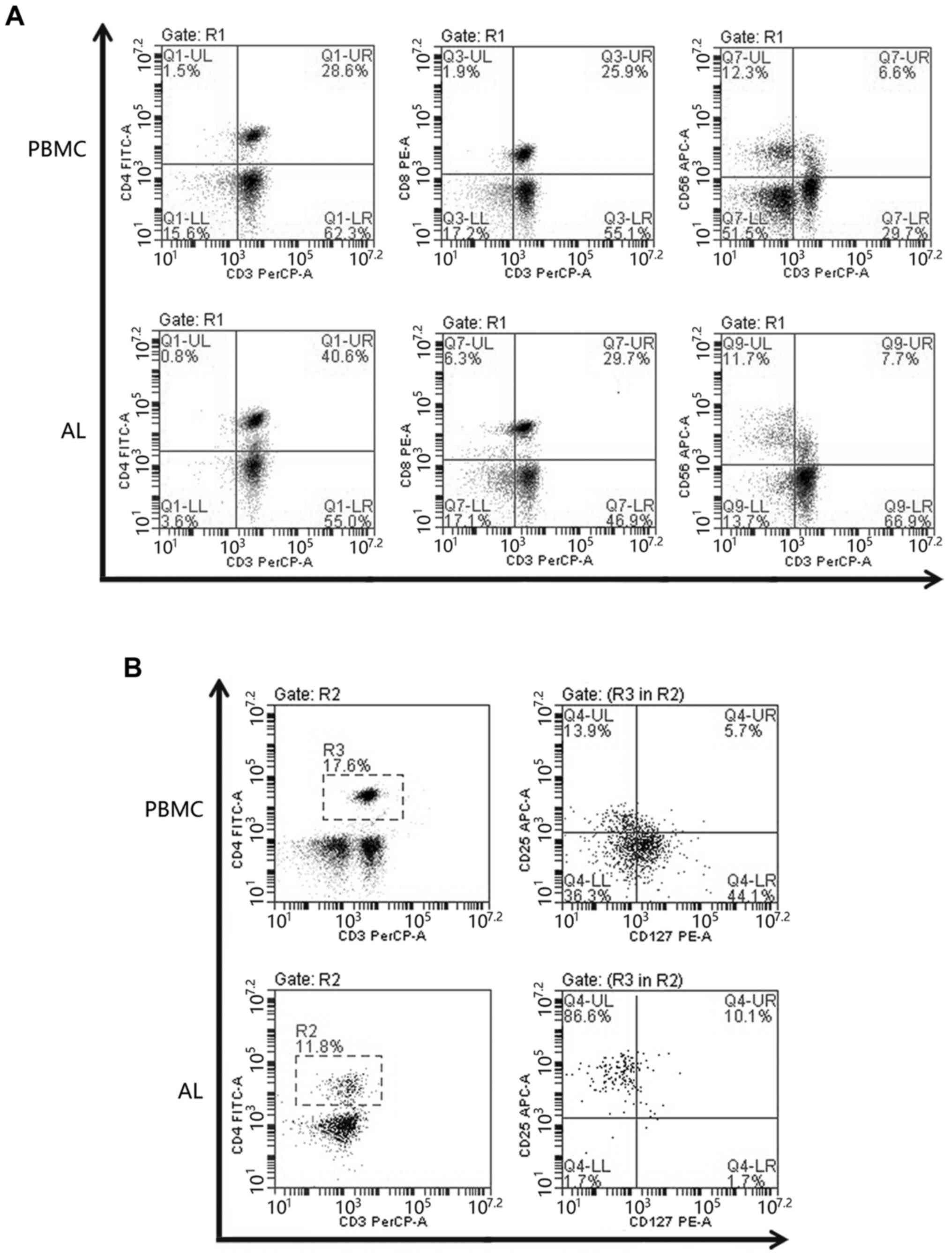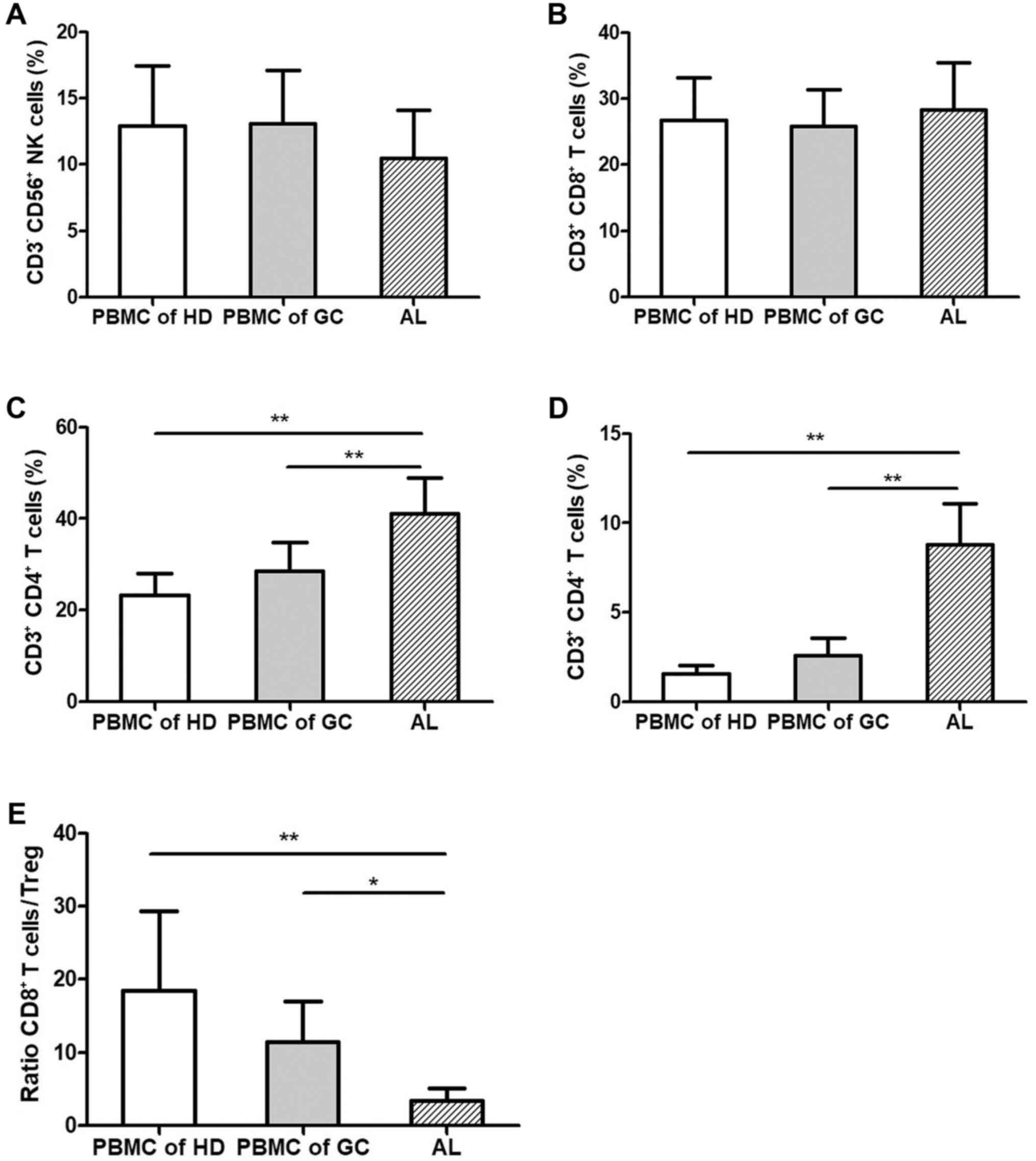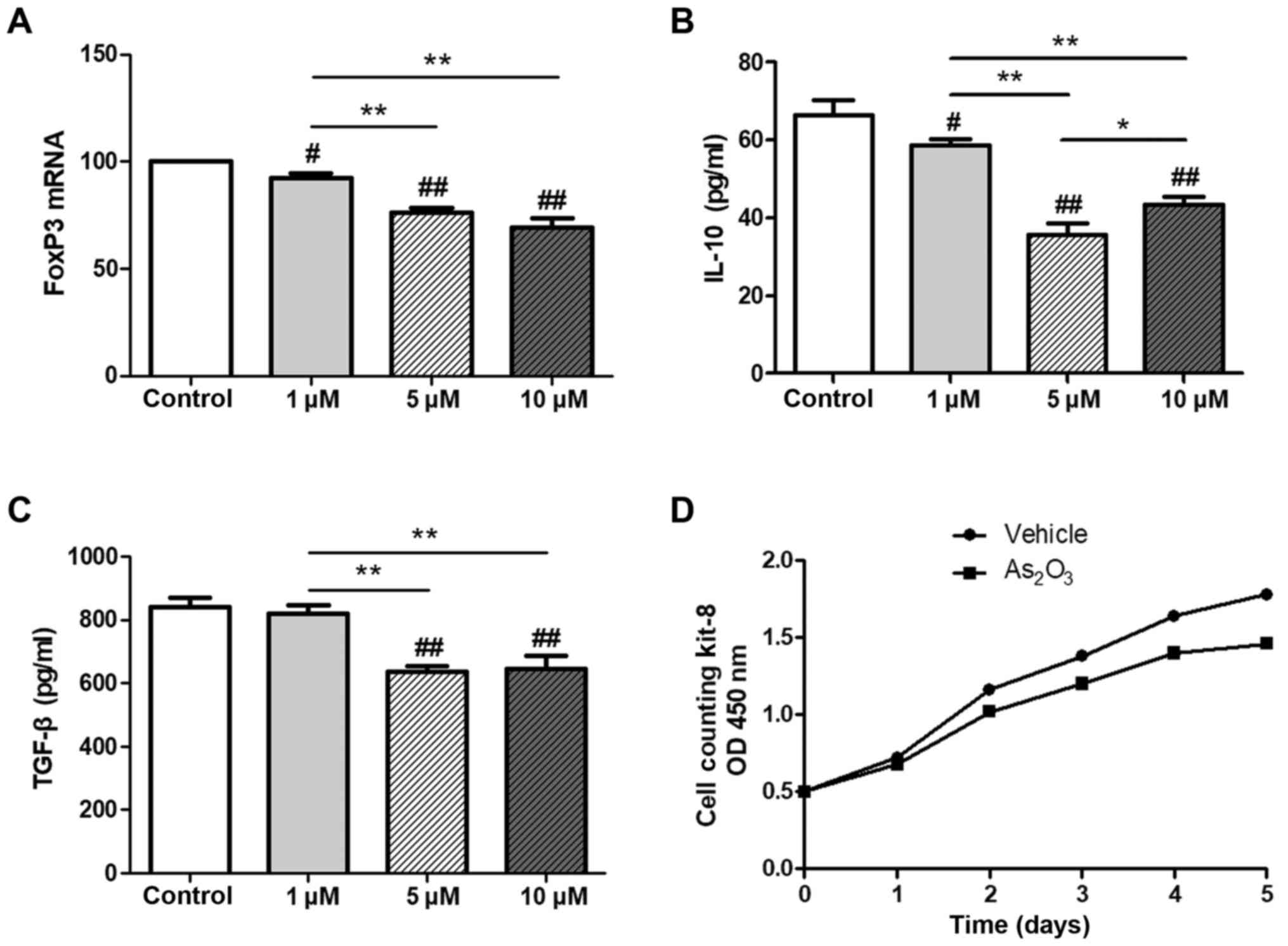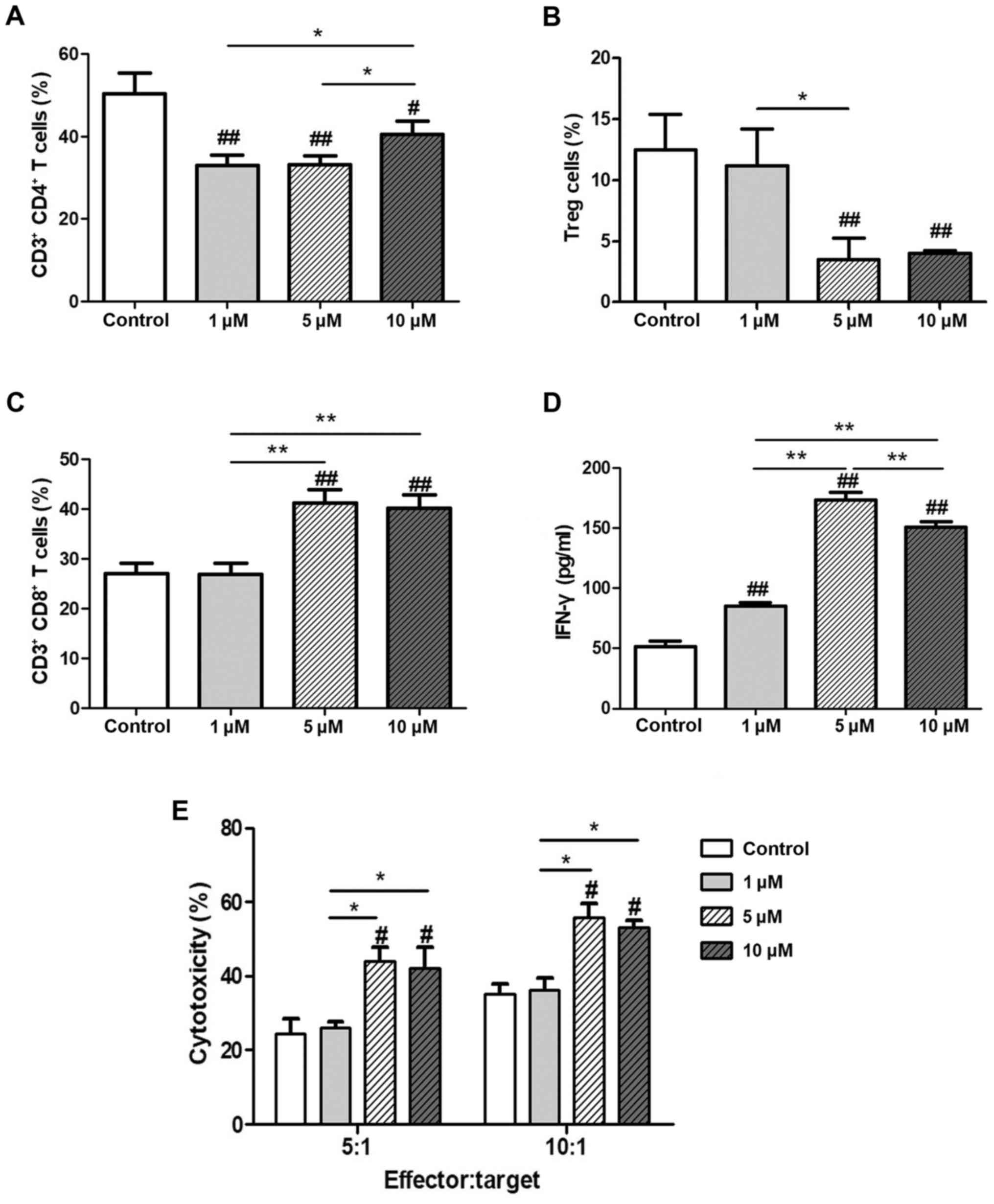|
1
|
Sakaguchi S, Sakaguchi N, Asano M, Itoh M
and Toda M: Immunologic self-tolerance maintained by activated T
cells expressing IL-2 receptor alpha-chains (CD25). Breakdown of a
single mechanism of self-tolerance causes various autoimmune
diseases. J Immunol. 155:1151–1164. 1995.PubMed/NCBI
|
|
2
|
Sayour EJ, McLendon P, McLendon R, De Leon
G, Reynolds R, Kresak J, Sampson JH and Mitchell DA: Increased
proportion of FoxP3+ regulatory T cells in tumor
infiltrating lymphocytes is associated with tumor recurrence and
reduced survival in patients with glioblastoma. Cancer Immunol
Immunother. 64:419–427. 2015. View Article : Google Scholar : PubMed/NCBI
|
|
3
|
Nishikawa H: Regulatory T cells in cancer
immunotherapy. Rinsho Ketsueki. 55:2183–2189. 2014.(In Japanese).
PubMed/NCBI
|
|
4
|
Zou W: Regulatory T cells, tumour immunity
and immunotherapy. Nat Rev Immunol. 6:295–307. 2006. View Article : Google Scholar : PubMed/NCBI
|
|
5
|
Sato E, Olson SH, Ahn J, Bundy B,
Nishikawa H, Qian F, Jungbluth AA, Frosina D, Gnjatic S, Ambrosone
C, et al: Intraepithelial CD8+ tumor-infiltrating
lymphocytes and a high CD8+/regulatory T cell ratio are
associated with favorable prognosis in ovarian cancer. Proc Natl
Acad Sci USA. 102:pp. 18538–18543. 2005; View Article : Google Scholar : PubMed/NCBI
|
|
6
|
Curiel TJ, Coukos G, Zou L, Alvarez X,
Cheng P, Mottram P, Evdemon-Hogan M, Conejo-Garcia JR, Zhang L,
Burow M, et al: Specific recruitment of regulatory T cells in
ovarian carcinoma fosters immune privilege and predicts reduced
survival. Nat Med. 10:942–949. 2004. View
Article : Google Scholar : PubMed/NCBI
|
|
7
|
Wang X, Jiang F, Mu J, Ye X, Si L, Ning S,
Li Z and Li Y: Arsenic trioxide attenuates the invasion potential
of human liver cancer cells through the demethylation-activated
microRNA-491. Toxicol Lett. 227:75–83. 2014. View Article : Google Scholar : PubMed/NCBI
|
|
8
|
Powell BL: Arsenic trioxide in acute
promyelocytic leukemia: Potion not poison. Expert Rev Anticancer
Ther. 11:1317–1319. 2011. View Article : Google Scholar : PubMed/NCBI
|
|
9
|
Zhou J: Arsenic trioxide: An ancient drug
revived. Chin Med J (Engl). 125:3556–3560. 2012.PubMed/NCBI
|
|
10
|
Li K, Zhang L, Xiang X, Gong S, Ma L, Xu
L, Wang G, Liu Y, Ji X, Liu S, et al: Arsenic trioxide alleviates
airway hyperresponsiveness and promotes apoptosis of
CD4+ T lymphocytes: Evidence for involvement of the ER
stress-CHOP pathway. Ir J Med Sci. 182:573–583. 2013. View Article : Google Scholar : PubMed/NCBI
|
|
11
|
Thomas-Schoemann A, Batteux F, Mongaret C,
Nicco C, Chéreau C, Annereau M, Dauphin A, Goldwasser F, Weill B,
Lemare F and Alexandre J: Arsenic trioxide exerts antitumor
activity through regulatory T cell depletion mediated by oxidative
stress in a murine model of colon cancer. J Immunol. 189:5171–5177.
2012. View Article : Google Scholar : PubMed/NCBI
|
|
12
|
Harlin H, Kuna TV, Peterson AC, Meng Y and
Gajewski TF: Tumor progression despite massive influx of activated
CD8(+) T cells in a patient with malignant melanoma
ascites. Cancer Immunol Immunother. 55:1185–1197. 2006. View Article : Google Scholar : PubMed/NCBI
|
|
13
|
Xiaohui DU, Wang X, Ning N, Xia S, Liu J,
Liang W, Sun H and Xu Y: Dynamic tracing of immune cells in an
orthotopic gastric carcinoma mouse model using near-infrared
fluorescence live imaging. Exp Ther Med. 4:221–225. 2012.
View Article : Google Scholar : PubMed/NCBI
|
|
14
|
Wing JB and Sakaguchi S: Multiple treg
suppressive modules and their adaptability. Front Immunol.
3:1782012. View Article : Google Scholar : PubMed/NCBI
|
|
15
|
Collison LW, Pillai MR, Chaturvedi V and
Vignali DA: Regulatory T cell suppression is potentiated by target
T cells in a cell contact, IL-35- and IL-10-dependent manner. J
Immunol. 182:6121–6128. 2009. View Article : Google Scholar : PubMed/NCBI
|
|
16
|
Makkouk A and Weiner G: Cancer
immunotherapy and breaking immune tolerance: New approaches to an
old challenge. Cancer Res. 75:5–10. 2015. View Article : Google Scholar : PubMed/NCBI
|
|
17
|
Chia WK, Teo M, Wang WW, Lee B, Ang SF,
Tai WM, Chee CL, Ng J, Kan R, Lim WT, et al: Adoptive T-cell
transfer and chemotherapy in the first-line treatment of metastatic
and/or locally recurrent nasopharyngeal carcinoma. Mol Ther.
22:132–139. 2014. View Article : Google Scholar : PubMed/NCBI
|
|
18
|
Jin CG, Chen XQ, Li J, Wu ZP, Liu X and
Wang XC: Moderating effects and maintenance of lung cancer cellular
immune functions by CIK cell therapy. Asian Pac J Cancer Prev.
14:3587–3592. 2013. View Article : Google Scholar : PubMed/NCBI
|
|
19
|
Vlad C, Kubelac P, Fetica B, Vlad D,
Irimie A and Achimas-Cadariu P: The prognostic value of
FOXP3+ T regulatory cells in colorectal cancer. J BUON.
20:114–119. 2015.PubMed/NCBI
|
|
20
|
Lee WS, Park S, Lee WY, Yun SH and Chun
HK: Clinical impact of tumor-infiltrating lymphocytes for survival
in stage II colon cancer. Cancer. 116:5188–5199. 2010. View Article : Google Scholar : PubMed/NCBI
|
|
21
|
Lechner A, Schlößer H, Rothschild SI,
Thelen M, Reuter S, Zentis P, Shimabukuro-Vornhagen A, Theurich S,
Wennhold K, Garcia-Marquez M, et al: Characterization of
tumor-associated T-lymphocyte subsets and immune checkpoint
molecules in head and neck squamous cell carcinoma. Oncotarget.
8:44418–44433. 2017. View Article : Google Scholar : PubMed/NCBI
|
|
22
|
Zhou Q, Bucher C, Munger ME, Highfill SL,
Tolar J, Munn DH, Levine BL, Riddle M, June CH, Vallera DA, et al:
Depletion of endogenous tumor-associated regulatory T cells
improves the efficacy of adoptive cytotoxic T-cell immunotherapy in
murine acute myeloid leukemia. Blood. 114:3793–3802. 2009.
View Article : Google Scholar : PubMed/NCBI
|
|
23
|
Nishikawa H and Sakaguchi S: Regulatory T
cells in tumor immunity. Int J Cancer. 127:759–767. 2010.PubMed/NCBI
|
|
24
|
Lemarie A, Bourdonnay E, Morzadec C,
Fardel O and Vernhet L: Inorganic arsenic activates reduced NADPH
oxidase in human primary macrophages through a Rho kinase/p38
kinase pathway. J Immunol. 180:6010–6017. 2008. View Article : Google Scholar : PubMed/NCBI
|
|
25
|
Chou WC, Jie C, Kenedy AA, Jones RJ, Trush
MA and Dang CV: Role of NADPH oxidase in arsenic-induced reactive
oxygen species formation and cytotoxicity in myeloid leukemia
cells. Proc Natl Acad Sci USA. 101:pp. 4578–4583. 2004; View Article : Google Scholar : PubMed/NCBI
|
|
26
|
Hori S, Nomura T and Sakaguchi S: Control
of regulatory T cell development by the transcription factor Foxp3.
Science. 299:1057–1061. 2003. View Article : Google Scholar : PubMed/NCBI
|
|
27
|
Vignali DA, Collison LW and Workman CJ:
How regulatory T cells work. Nat Rev Immunol. 8:523–532. 2008.
View Article : Google Scholar : PubMed/NCBI
|


















